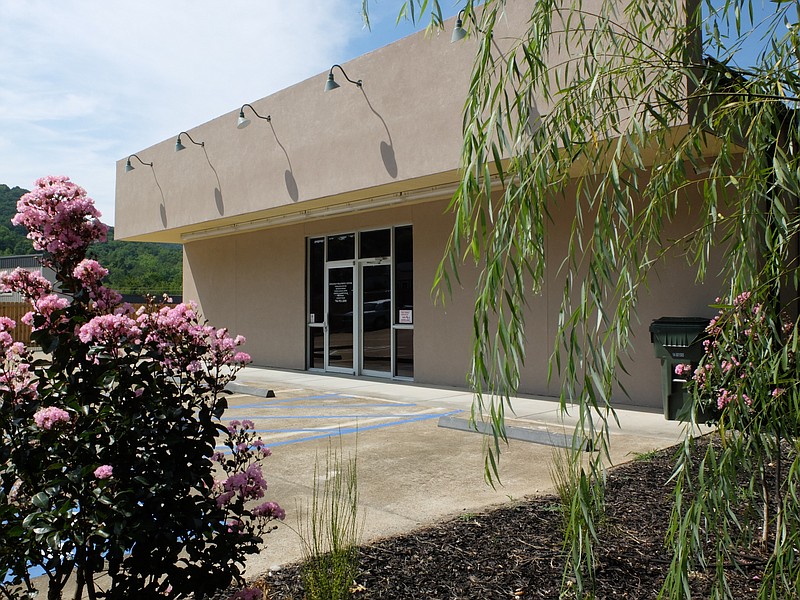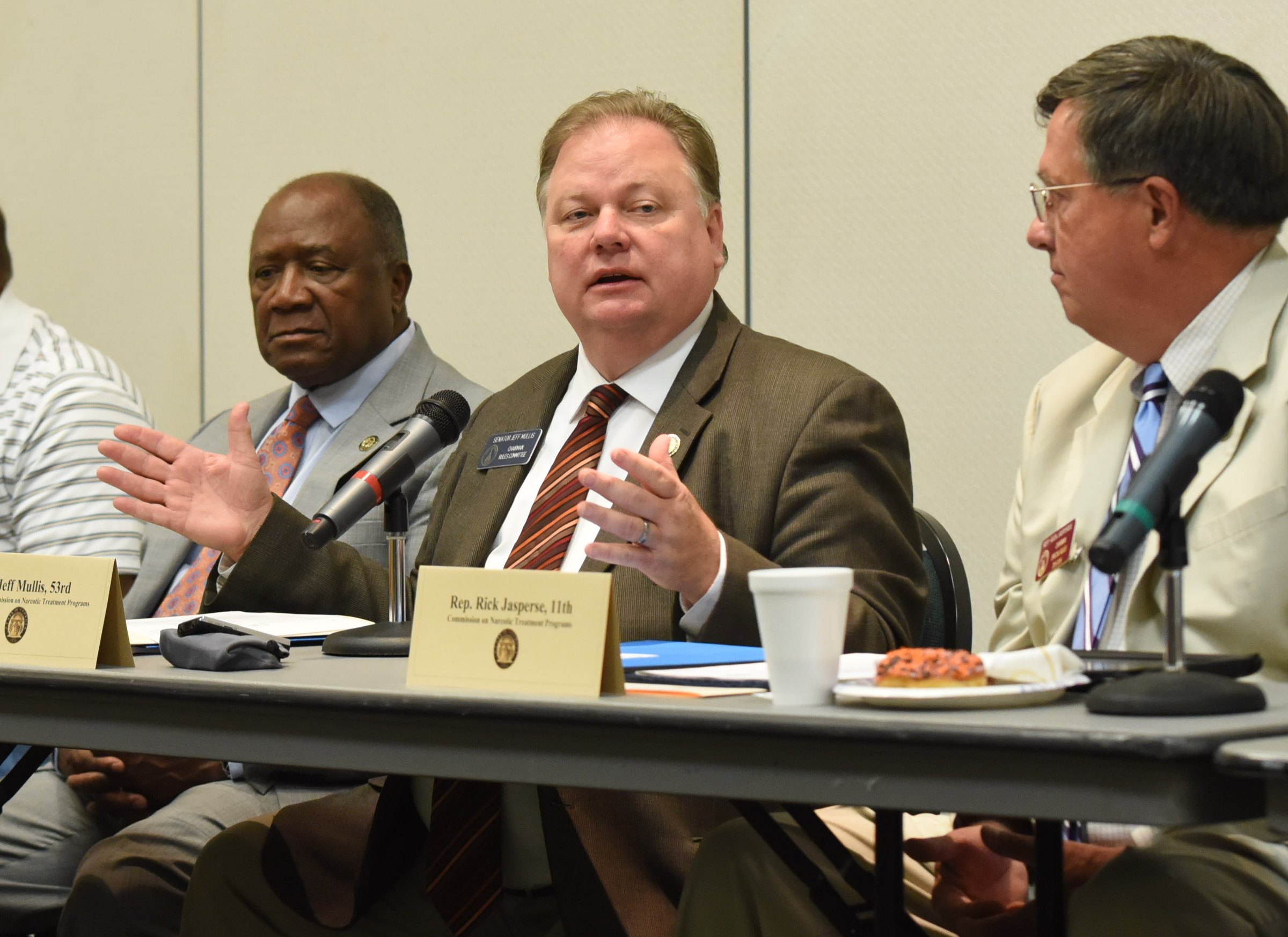NUMBER OF OPIOID TREATMENT CENTERS
Georgia: 71Tennessee: 14Alabama: 24North Carolina: 53South Carolina: 20Florida: 67Source: Substance Abuse and Mental Health Services Administration
OPIOID-RELATED DEATHS
Georgia2013: 1,0982014: 1,2062015: 1,302Tennessee2013: 1,1872014: 1,2692015: 1,457Source: U.S. Centers for Disease Control and Prevention
At least for now, directors of opioid addiction treatment programs in Georgia support a bill to regulate their industry.
The proposal, introduced last week by state Sen. Jeff Mullis, R-Chickamauga, would make it more difficult to open new programs. It would also limit the number of clinics in different regions of the state.
"Mullis has wooed me," said Zac Talbott, the chief operating officer of Counseling Solutions of Chatsworth. "I was critical. I was concerned. I felt like this was going to shut down treatment. I've had to eat crow."
As it stands, Talbott said, the bill would help state health officials weed out any unethical medical directors who care more about selling drugs like methadone than their patients' health. At the same time, the bill does not regulate the industry too strongly, so more clinics can open in Georgia if the owners prove local addicts need the treatment.
Talbott was cautiously optimistic, however. The bill will go before the Regulated Industries and Utilities Committee on Thursday, and Talbott worries other lawmakers will create extra regulations. He fears they could make opening a new clinic too difficult.
Jonathan Connell, president of the Opioid Treatment Providers of Georgia, echoed Talbott's sentiment: The bill works if legislators don't add more restrictions.
"We need to all be very aware that we are in an epidemic of opioid dependency," he said. "It's a hot topic. We need to be very careful that we pass good legislation that doesn't decrease the treatment around opioid addiction."
Since 1999, according to the U.S. Centers for Disease Control and Prevention, overdose deaths involving opioids have quadrupled. The trend began in the late 1990s when doctors started prescribing more pain pills. It continued this decade with an influx of heroin in the drug market.
From 2013-15, the number of opioid overdose deaths per year in Georgia increased from 1,100 to 1,30, according to the CDC. During that same time in Tennessee, deaths rose from 1,190 to 1,460.
Drugs like methadone and buprenorphine are supposed to calm the tide. When addicts stop using opioids, they feel physical pain. It's hard to work in the condition, and it's hard to stay clean. But methadone and buprenorphine provide small doses of the opioid, allowing an addict to function at work while recovering.
There are some potential downsides to the drug. They can cause heart conditions if combined with other medications. And if they're not prescribed at the proper dosage level, the addict will become hooked on that medication itself, defeating the purpose.
At a medication assisted treatment program, addicts receive their dosage of the drug. They also go through counseling. Over time, the amount of the drug they actually need is supposed to wind down.
According to the Substance Abuse Mental Health Services Administration, Georgia has 71 medication assisted treatment programs. That's more than any of the states it borders, though the differences range from 12 in Tennessee to 67 in Florida.
Mullis, who did not return a call seeking comment, passed legislation last year that placed a one-year moratorium on any new opioid treatment centers in the state. He then formed a study committee to look into the issue last fall. He issued this bill as a result.
The bill divides the state into regions. If a region has four treatment clinics, a medical director can't open a new one. For example, Region 1 consists of Catoosa, Chattooga, Dade and Walker counties. The area already has four clinics, tucked together right by the state line.
The bill would also demand that someone trying to open a clinic answer a number of questions. What are you going to do at the clinic, specifically? Who will work there? Where will the clinic be? How many clinics are within 75 miles of it? Are those clinics crowded?
A committee within the Georgia Department of Community Health would then decide whether to approve the application.
Right now, clinic owners have other regulations to satisfy. They have to get approval from the substance abuse mental health administration, the Drug Enforcement Agency and the Georgia Board of Pharmacy. They also have regulations through the Department of Community Health, like they will under the bill from Mullis.
"But there's not a lot of vetting that goes with the application," said Brook Etherington, vice president of Alliance Recovery Centers. "Pretty much anyone could try to open a program."
State Sen. Renee Unterman, R-Buford, also has proposed a regulatory bill, which demands that Department of Community Health inspectors look at every clinic every year. But that would require a boost in state funding. The department's division chief for health care facility regulation said in October that the agency can only afford four surveyors.
Locally, some elected officials are happy with Mullis' bill, though they would prefer more regulation on the clinics. Catoosa County Coroner Vanita Hullender would like more required drug tests for patients, and she believes the Georgia Bureau of Investigation should monitor the clinics instead of the Department of Community Health.
Hullender has been concerned about opioid clinics for years. She said she has seen an uptick in autopsies in which the deceased mixed methadone with heroin, Xanax or oxycodone.
Catoosa County Sheriff Gary Sisk said these clinics should have to receive a certificate of need from the Department of Community Health before opening, the way a hospital does. He believes this would weed out unnecessary clinics.
He also wishes the state would ban Tennessee patients from coming to Georgia clinics. The state keeps a database of who is receiving prescriptions for medications. But out-of-state patients won't be in the database, he said, giving them a chance to get too many doses of the drug.
Sisk is concerned people get extra pills and abuse them. Or sell them on the street.
"It's at least a step in the right direction," he said of the bill. "I hope it's supported."
Contact staff writer Tyler Jett at 423757-6476 or tjett@timesfreepress.com.

